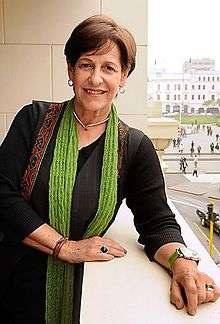Susana Villarán
| Susana Villarán | |
|---|---|
 | |
| Mayor of Lima | |
|
In office January 2, 2011 – January 1 2015 | |
| Preceded by | Marco Parra Sánchez (interim) |
| Succeeded by | Luis Castañeda Lossio |
| Minister of the Promotion of Women and of Human Development | |
|
In office November 22, 2000 – July 28, 2001 | |
| President | Valentín Paniagua |
| Preceded by | Luisa María Cuculiza |
| Succeeded by | Doris Sánchez |
| Personal details | |
| Born |
August 16, 1949 Lima, Peru |
| Political party | Fuerza Social |
| Spouse(s) |
Manuel Piqueras Luna (separated) |
| Children | Emmanuel, Soledad and Ignacio |
| Profession | Journalist |
| Website | Susana Villarán |
Susana María del Carmen Villarán de la Puente is a centre-left politician in Peru, a former presidential candidate, and in municipal elections in 2010 became the first woman to be elected Mayor of Lima.
She is vice-president of the Social Force Decentralisation Party (Partido Descentralista Fuerza Social, FS) and formerly worked as a journalist and a secondary school teacher.
Personal life
Born in Lima on 16 August 1949. She was the first daughter and the second of the seven children of Fernando Villarán Duany and Josefina de la Puente y Lavalle. Villarán studied at L'École Nouvelle of Miraflores and Colegio Sagrados Corazones Chalet of Chorrillos.
Political life
She was a member of Lima's Metropolitan Municipality from 1983 to 1985, and co-founded with former mayor Alfonso Barrantes Lingán the Vaso de leche (glass of milk) program promoting child nutrition.
In 1995 Villarán was elected national co-ordinator of the Party for Social Democracy (Partido por la Democracia Social - Compromiso Perú, PDS). She became Minister for Women and Social Development during Valentín Paniagua's transitory government in 2001, and in 2002 she assumed the role of Police Ombudsman (Defensora de la Policía).
From 2002 to 2005, she served as a member of the Organization of American States's Inter-American Commission on Human Rights (IACHR), serving as rapporteur on child rights and later on women's rights, as Second Vicepresident of the Commission in 2004, and First Vicepresident in 2005. She took part in IACHR human rights and conflict missions in Colombia and Guatemala.
In the Peruvian general election of 2006 Villarán was presidential candidate for Concertación Descentralista, an alliance of the PDS and the Peruvian Humanist Movement. She was one of three female candidates along Lourdes Flores and Martha Chávez, and came seventh with 0.62%.
In 2008, she was elected to the United Nations Committee on the Rights of the Child.[1]
2010 campaign
In 2009 she announced her candidacy for Mayor of Lima as leader of the Social Force Decentralisation Party (FS), which had been formed by the merger of the PDS and eight other centre-left parties in October 2007. Her candidature was backed by three smaller centre-left groups.
After a slow start to her campaign, in the final weeks Villarán overtook the longtime favourite candidate Lourdes Flores[2] to win with 1,743,712 votes, representing 38.393% of the valid votes.[3] She assumed office in January 2011.
There was a referendum held to recall her from office, which was held on March 17, 2013.[4][5] She survived the recall but 20 members of the city council were recalled. However, she lost her 2014 re-election bid to former mayor Luis Castañeda Lossio, who took office on January 1 2015.[6]
Publications
- Picking Up the Pieces: Corruption and Democracy in Peru, with Nick Caistor, (London : Latinamerica Bureau) 2006. ISBN 1-899365-75-3.
References
- ↑ "Susana Villaran de la Puente (Peru)" (PDF). 2.ohchr.org. Retrieved 2012-11-12.
- ↑ "Susana Villarán alcanza 42% en las encuestas mientras Lourdes Flores baja a 28% - Perú | Terra Perú". Terra.com.pe. Retrieved 2012-11-12.
- ↑ Archived December 6, 2010, at the Wayback Machine.
- ↑ "Mayor and mafias: A referendum too far". economist.com. November 10, 2012. Retrieved 2013-02-07.
- ↑ "JNE oficializa fecha para la revocatoria" (in Spanish). Retrieved 2013-02-07.
- ↑ Kozak, Robert (6 October 2014). "Peru Voters Return Former Lima Mayor to Office". Wall Street Journal. Retrieved 12 May 2015.
External links
| Wikimedia Commons has media related to Susana Villarán. |
- 2010 elections campaign website
- Partido Descentralista Fuerza Social
- Personal blog
- Named one of 10 Latin American Women to Watch in 2014
| Preceded by Marco Parra Sánchez |
Mayor of Lima January 2, 2011 – January 1, 2015 |
Succeeded by Luis Castañeda Lossio |
| Preceded by Luisa María Cuculiza |
Minister of Women and Social Development November 22, 2000 – July 28, 2001 |
Succeeded by Cecilia Blondet |